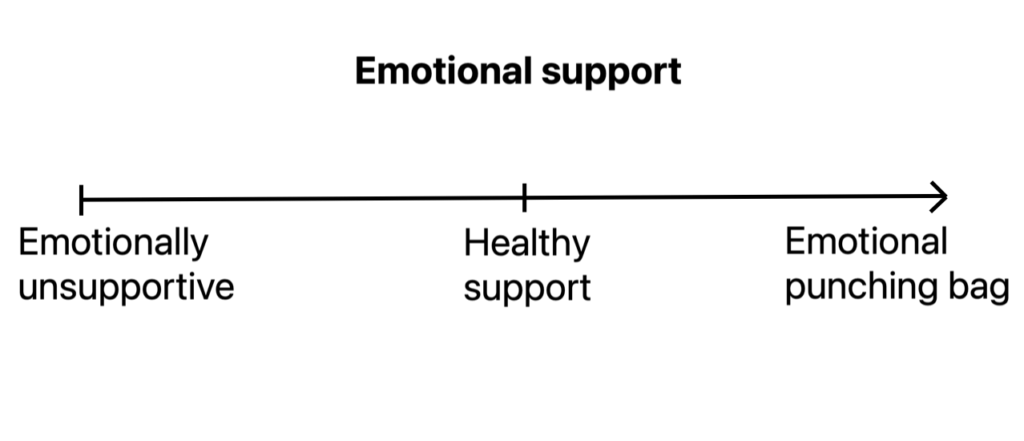Human relationships are built on the principle of reciprocity- a balance of give and take. That also includes emotional reciprocity, which is a mutual sharing and co-regulation of emotions.1Parkinson, B., & Manstead, A. S. (2015). Current emotion research in social psychology: Thinking about emotions and other people. Emotion Review, 7(4), 371-380. When you become someone’s Emotional Punching Bag (EPB), the principle of emotional reciprocity gets violated.
What does it mean to be someone’s EPB?
If you’re angry and feel like punching someone, it’s better to dump your anger on a punching bag. Similarly, when you’re someone’s EPB, they dump their negative emotions, stresses, irritations, and frustrations on you.
Effects of being an EPB
We tend to take on other people’s emotions, positive or negative.2Brennan, T. (2004). The transmission of affect. Cornell University Press. When we become someone’s EPB, we take on their negative emotions. At the same time, we have limited emotional bandwidth. That means we can only hold so much emotion. We need our emotional bandwidth to hold our own emotions and feelings.
When we listen to someone venting, their negative emotions take up our emotional bandwidth. That’s okay if done in a limited manner or when there’s emotional reciprocity in a relationship. But if you find that you’re holding their emotions in your emotional bandwidth most of the time, you’ve become their EPB.
When someone has turned you into their EPB, you’ll find that you get emotionally drained during and after your interaction with them. They give you a sense that you’re losing yourself. Because not losing yourself is primarily about holding space in your mental/emotional bandwidth for your thoughts and feelings.
Losing yourself this way is common in romantic relationships where one tends to give too much space to their partner’s emotions. Unsurprisingly, being your partner’s EPB is also common, though it can occur in any relationship.
Healthy support vs EPB
You have to give up parts of your emotional bandwidth to others if you want to maintain a healthy relationship with them. However, if you’re a highly empathetic person, this tendency of yours is likely to get exploited by emotionally selfish people like codependents and covert narcissists.
At what point does healthy support turn into being an EPB?
Your feelings can guide you best here. You know when you’re in a healthy, emotionally balanced relationship. When you’re treated like an EPB, you’ll feel used and duped.3Vohs, K. D., Baumeister, R. F., & Chin, J. (2007). Feeling duped: Emotional, motivational, and cognitive aspects of being exploited by others. Review of General Psychology, 11(2), 127-141. It’s your mind warning you that you’re losing more than you’re gaining. That the other person may be a red flag.
| Aspect | Healthy Support | EPB |
|---|---|---|
| Emotional balance | Mutual sharing; both people get space for emotional expression. | One-sided sharing; the other person dominates, you don't feel heard. |
| Respect | Your feelings and boundaries are acknowledged. | Your feelings are dismissed, minimized, or ignored. |
| Tone of Interaction | Calm, empathetic, and constructive. | Hostile, blaming, or overly negative. |
| Frequency | Occasional venting that doesn’t overwhelm the relationship. | Chronic dumping becomes the default dynamic. |
| Outcome | You feel connected, supportive, and sometimes even closer. | You feel drained, resentful, anxious, or unimportant. |
| Responsibility | You listen and may offer help, but they remain responsible for their emotions. | You’re made to feel responsible for fixing or carrying their emotions. |
| Boundaries | Clear limits respected (time, energy, emotional capacity). | Boundaries ignored; you tolerate treatment you’re not okay with. |
How to cope
Your tendency to become others’ EPB may stem from your people-pleasing tendencies, which may stem from childhood trauma.4Kaya, Z., Kale, K., Yağan, F., & Kaya, Ş. (2024). The mediating role of resilience in the relationship between childhood emotional abuse and emotional neglect and codependency. Children and Youth Services Review, 161, 107670. Societal and parental conditioning also play a role. We’re taught to be good listeners since childhood, but are never taught that there can be such a thing as too much listening. We’re taught to lend an empathic ear to those in distress without regard for our own subjective well-being.

Wasting your emotional bandwidth on others’ issues and concerns isn’t usually a sign of mental strength or empathy. It’s a lack of emotional boundaries and assertiveness. When someone dumps their negative emotions on you without regard for how it will psychologically impact you, they’re communicating:
“My issues and concerns are so much more important than yours that they deserve our combined attention.”
It’s emotional selfishness. People get angry when someone barges into their home, but they easily allow others and their negative emotions to live rent-free in their heads. You have a right to protect your mental/emotional bandwidth. Only you can choose how much to give to whom and when. People can’t just trample on your mental space.
Scripts
Next time you catch yourself in a dynamic where you’re getting emotionally exploited like this, try these phrases:
“I didn’t do anything to anger you. How about you dump your anger on the one who actually made you mad?”
“Right now, I don’t have the mental energy and bandwidth to listen to your venting.”
“We’ll talk about it at a later time when I’m in a better state mentally.”
“Right now, I’m too busy thinking about my issues. I can’t take on yours.”
If they understand and are considerate of your mental well-being, you’ve got yourself a healthy relationship. If they’re so self-absorbed that they see your right to your own emotional bandwidth as a lack of support, selfishness, or stinginess, you’re with an entitled person who has no regard for you.

